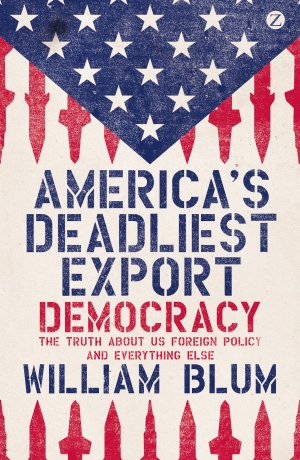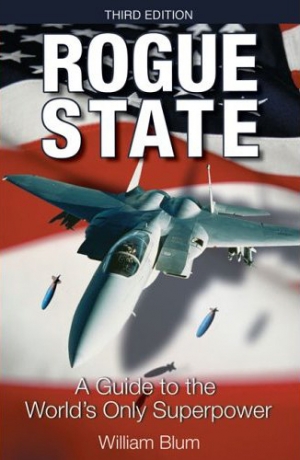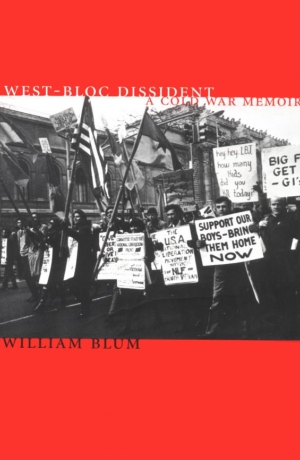The Anti-Empire Report #8
By William Blum – Published March 10th, 2004
A quaint German custom the United States used to have On
March 4 a German appeals court ordered a new trial for the only person to be convicted for a role in the Sept. 11, 2001 attacks in the United States, saying the proceeding had been compromised by a US refusal to provide access to a key witness.
Defense attorneys for Mounir Motassadeq, a Moroccan citizen, had repeatedly asked for testimony from Ramzi Binalshibh, who is in secret US custody. US officials have called Binalshibh a central conspirator in the attacks but declined to produce him for the trial, citing national security concerns.
The appeals court found that the Hamburg court that had convicted Motassadeq had not adequately considered the implications of the absence of evidence from Binalshibh.
Andreas Schulz, a German lawyer who has represented the families of September 11 victims, said many of his clients were very upset with the ruling. He said he had told them that the decision stemmed from the two countries’ contrasting approaches to terrorism – the United States is waging war on it, while Germany is sticking with a courtroom approach.
The German system stresses “fair trial, presumption of innocence and all the values that were designed and generated after World War II,” he said. “From the German point of view, it’s absolutely [logical] to come up with a decision like the appeals court came up with today.” 1
Neo-con(tradictions)
Colin Powell showed that he can be a neo-con hardliner just like the rest of the Bushgang. Speaking at the neo-conservative shrine, the Heritage Foundation, on March 2, Powell declared that Asian communism is “withering away.” “The share of the economy owned by the government is smaller today in China than it is in France – always an interesting comparison to make.” 2
What would be equally interesting would be to compare the standard of living, multiple benefits and labor rights of the average Chinese and French workers. An American worker would not fare too well either in comparison with a French worker. But at least the American and Chinese workers in the private sector have the deep satisfaction of knowing that their work is not tainted by any government ownership.
A new book, scheduled for release in late March, “At the Abyss: An Insider’s History of the Cold War” by Thomas Reed, a member of Ronald Reagan’s National Security Council, reveals that Reagan approved a CIA plan to sabotage the economy of the Soviet Union through covert transfers of technology that contained hidden malfunctions, including software that later triggered a huge explosion in a Siberian natural gas pipeline. Reed writes that the pipeline explosion was carried out “in order to disrupt the Soviet gas supply, its hard currency earnings from the West, and the internal Russian economy.” This was just one example of “cold-eyed economic warfare” against the Soviet Union that the CIA carried out during the Reagan administration, he writes.
Reagan was perhaps the leading neo-con of his day, often poking fun at the Soviet economic system and how it couldn’t compare to the American system. Yet he apparently was not always willing to allow a wholly fair and honest competition between the two systems, preferring to rely on sabotage at times. This of course did not begin with the Reagan administration. The CIA was engaged in all kinds of economic dirty tricks against the Soviet Union and its satellites, particularly East Germany, for decades before Reagan.
“Human kind cannot bear very much reality.” T.S. Eliot
Last year, Libya “accepted responsibility” for the bombing of PanAm flight 103 over Lockerbie, Scotland in 1988. Although even a superficial reading of Libyan statements on the matter made it plain that they were NOT admitting to actually planting the deadly bomb, American and British officials pretended that it was such an admittance; ergo, case closed, the US and the UK had once again seen to it that justice triumphed, Libya will pay compensation to the victims’ families, the US will consider lifting sanctions against Libya, everyone happy.
Then, on February 24, Libya’s prime minister Shokri Ghanem insisted to the BBC that his government’s statements were not an admission of actual guilt. “We thought it was easier for us to buy peace and this is why we agreed to compensation,” he said. “Therefore we said: ‘Let us buy peace, let us put the whole case behind us and let us look forward’.”
Not fair! cried the White House and 10 Downing Street. Libya was not playing the game right. They were cheating. The Bush administration abruptly canceled plans to lift the travel ban and other restrictions on Libya that had been planned (in return for Libya scrapping its nuclear weapons program as well as the Lockerbie issue). “It’s important for Libya to retract these statements,” said the State Department, “and to make clear what their policy is as soon as possible.”
The Libyan prime minister had of course made clear what he thought the truth was, but that was not what the State Department was asking for. They were asking to make the “policy” clear; i.e, Are you still playing the game or not?
The head of the UK families organization declared: “We don’t understand the comments by prime minister Ghanem. Nobody knows why he has said this.” The fact that Ghanem simply wanted to inject some truth into the matter and clear Libya’s name apparently was not an option to be considered.
Then, Libya quickly returned to the game, saying it wanted “to set the record straight and be perfectly clear” about its position on the Lockerbie bombing. Its August 2003 statement of accepting responsibility for the plane bombing was still valid. “Recent statements contradicting or casting doubt on these positions are inaccurate and regrettable,” said the Libyan government.
Just as quickly, the State Department, referring to the Libyan statement, announced: “They have done what they needed to do.” 3
Make him an offer he can’t refuse
Statement of Jean-Bertrand Aristide, President of Haiti, March 5, 2004, from exile in the Central African Republic:
“The 28th of February, at night, suddenly, American military personnel who were already all over Port-au-Prince descended on my house in Tabarre to tell me first that all the American security agents who have contracts with the Haitian government only have two options. Either they leave immediately to go to the United States, or they fight to die. Secondly, they told me the remaining 25 of the American security agents hired by the Haitian government who were to come in on the 29th of February as reinforcements were under interdiction, prevented from coming. Thirdly, they told me the foreigners and Haitian terrorists alike, loaded with heavy weapons, were already in position to open fire on Port-au-Prince. And right then, the Americans precisely stated that they will kill thousands of people and it will be a bloodbath. That the attack is ready to start, and when the first bullet is fired nothing will stop them and nothing will make them wait until they take over, therefore the mission is to take me dead or alive. … Faced with this tragedy, I decided to ask, “What guarantee do I have that there will not be a bloodbath if I decided to leave?
“In reality, all this diplomatic gymnastics did not mean anything because these military men responsible for the kidnapping operation had already assumed the success of their mission. What was said was done. This diplomacy, plus the forced signing of the letter of resignation, was not able to cover the face of the kidnapping.”
A search of the Lexis-Nexis database on March 10 failed to turn up any article in an American newspaper or broadcast medium which discussed the contents of Aristide’s statement; this despite news of it being carried by the Associated Press. Several papers in Canada and the UK did carry stories about the statement.
Thus it was that Aristide went into exile. And then Colin Powell, in the sincerest voice he could muster, told us that Aristide’s departure was completely voluntarily; it was his own idea; no pressure from the United States. Powell sounded as sincere as he had sounded a year earlier when he gave the UN a detailed inventory of the chemical, biological and nuclear weapons in Iraq.
Despite all the dishonesty surrounding Iraq, I’d guess that most Americans tend to believe Bush officials concerning Haiti because of a couple of reasons. One: Many of the media accounts of the past few months have mentioned that in 1994 the US military returned Aristide to power. That sounds pretty impressive; it indicates that concerning Haiti and Aristide the United States has its heart in the right place. But “the US returned Aristide to power in 1994” is just the headline. If one reads the story below the headline the picture looks remarkably different. It’s simply not the same story any longer. It can be read online.
A second reason the public may support US policy in Haiti is that they’ve been fed one story after another about Aristide’s government being brutal and corrupt and Aristide himself being mentally unstable and largely responsible for the current crisis. That’s typical before the US moves to overthrow a foreign government. It’s actually rather easy to plant stories in the media, with or without their cooperation. In 1994, a similar story of Aristide being mentally unstable, a murderer and psychopath, was created and disseminated by a CIA official named Brian Latell, without any evidence to back up the charges. 4
Of course to Washington officials it wouldn’t matter if Aristide were a saint. They wanted him out, and out he went.
Is Cuba to blame?
A thought about another tiny country the world’s only superpower just can’t leave alone – Cuba. Cubans often complain about the many hardships imposed upon their life by the US blockade. Defenders of US policy reply that this is just an excuse for Cuba’s own failings, that the hardships are the inevitable result of a socialist economic system. It makes me think of this analogy. Someone is constantly pounding your head with a hammer and you keep getting headaches. You complain to the wielder of the hammer and demand that he stop hitting you. The guy says to you: The headaches are due to the way you live; blaming me is just an excuse you make up to shirk your own responsibility. You then say to him: Well, why don’t you stop hitting me on the head with your hammer so we can see if the headaches go away?
Notes
- Washington Post, March 5, 2004
- Washington Post, March 3, 2004
- The Guardian (London), February 25, 2004; Washington Post, February 25-27
- Ibid.
Any part of this report may be disseminated without permission, provided attribution to William Blum as author and a link to williamblum.org is provided.




